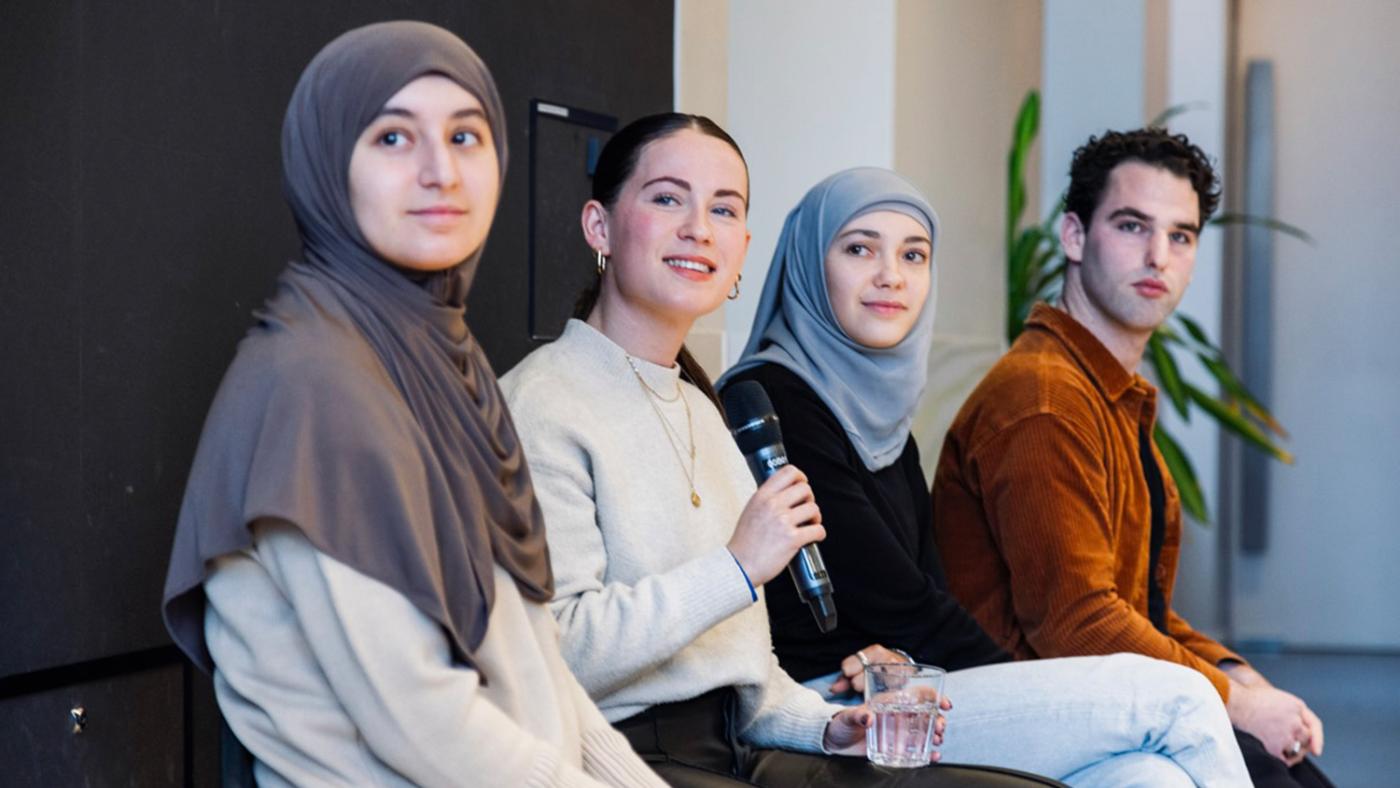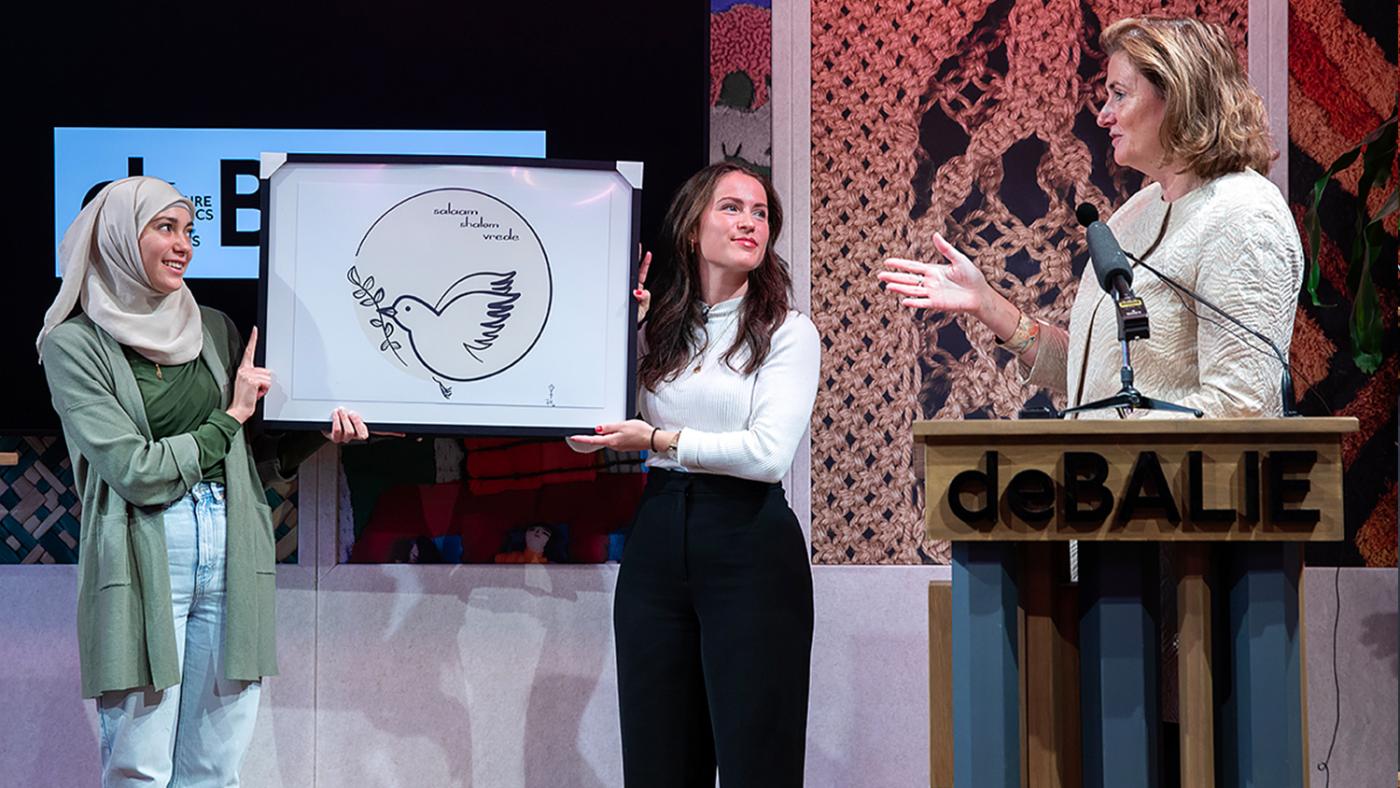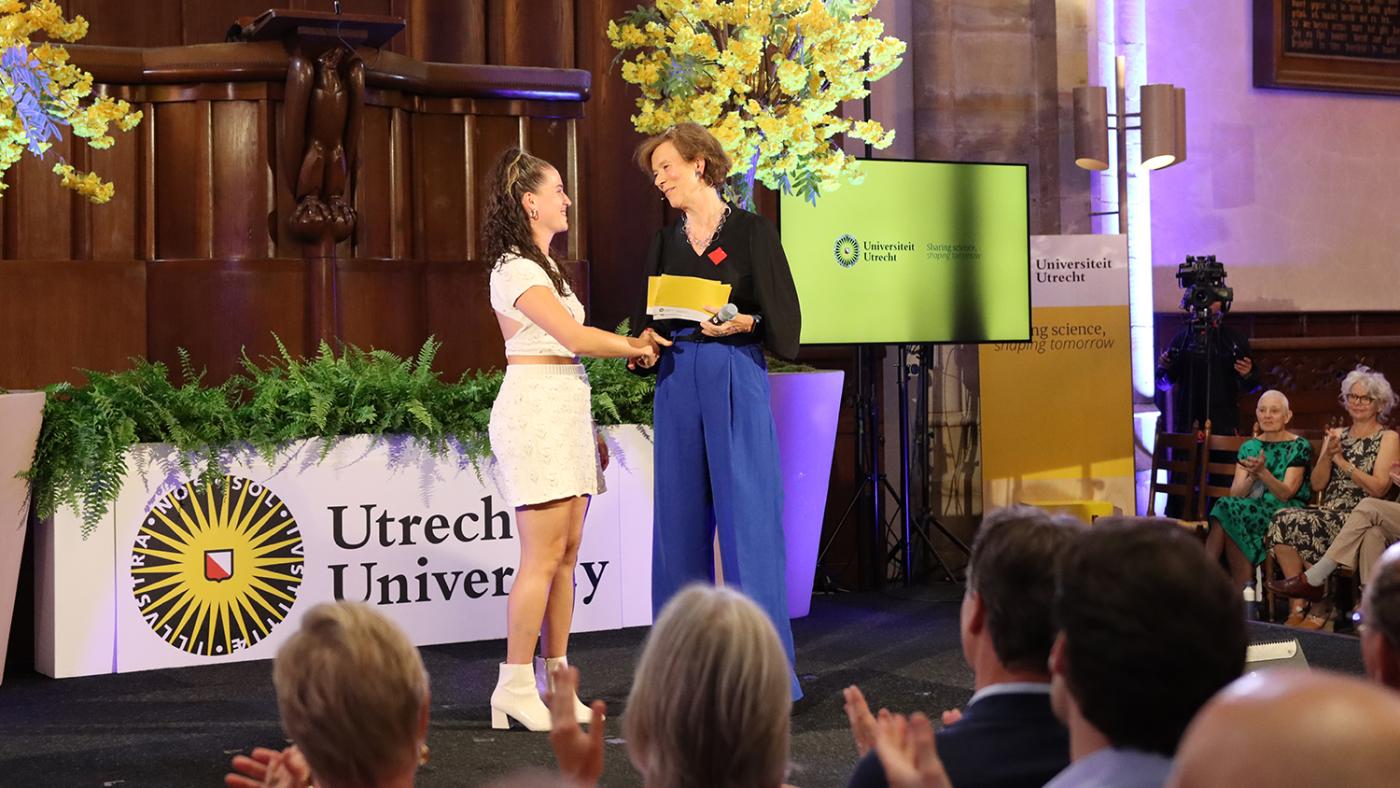Meet Noa Duizend, winner of the Student Award for Social Impact
'If you can open your ears to someone, your heart will open too'

A few days after Hamas attacked Israel last year, UU Psychology student Noa was invited to participate in a meeting in her hometown, Amsterdam. The meeting was organised by Yalla!, a foundation that has been fostering social cohesion between Muslim and Jewish citizens since 2020. "I talked to Selma there and asked her how it feels to wear a headscarf in these times. She told me it made her anxious, she felt watched. I could relate to that feeling," says Noa, who wears a necklace with her name in Hebrew.
Boaz, also Jewish, and Oumaima, a Muslim, also joined the conversation. "We found out that we all felt horrible. It was a relief to share this." According to Noa, the conversation softened because it focused on the emotions they shared, not their differences of opinion. "We then wondered how we could encourage such conversations in Dutch society," she says. After a week of brainstorming, they came up with "Share the Dove". They launched the initiative live on the late-night talk show Humberto, which led to many invitations for interviews and guest lectures.

What exactly is 'Share the Dove'?
"We visit schools and businesses, not necessarily to hold dialogues there but to show how dialogues can be conducted. We share our stories and show what it takes to have a good conversation. A good conversation is not about facts. Facts are shaped by what you see, algorithms, and who you hang out with. You shouldn’t want to convince someone of your facts – that won’t lead to a better understanding. Instead, you should strive to understand where the other person’s coming from and ask more questions when something is difficult to hear."
"The message is delivered in several ways. For example, by giving a guest lecture as part of the History or Sociology class. Sometimes we’re interviewed in front of a big group." They also once hosted a roundtable discussion at the Dutch public broadcaster NOS, where staff could join. "Our goal is to create a space for these conversations, which is already considered pretty tough in many places."

Do you think it's impossible to start these conversations in certain circumstances, for example when people feel unsafe?
"Safety is a complex concept. It can easily feel like an attack or a platitude. We prefer to talk about creating an open atmosphere. People need to allow themselves to be vulnerable. If everyone agrees that no one says anything to hurt the other, all of a sudden, a lot of possibilities open up. People may still get hurt, but at least they can talk about that."
You see, when someone hurts us, we tend to cover our ears and stop listening. But that is precisely the moment to say their remarks hurt you and ask the person why they said that. If you manage to open your ears to that other person, your heart will open too.”
The problem is that we sometimes want to compare our suffering, to show how much pain we are in. If I hurt my toe and then you hurt your knee, it's pointless to argue you're in more pain than I am. You could just say: ‘I feel bad that you’re hurt, I’m hurting too.’ It may be a stupid example, but the same goes for emotional pain.”

Noa talking to Frans Timmermans. Photo: courtesy of the student
How is the initiative being received?
"We’re getting a huge amount of praise. Teachers tell us they finally know how to facilitate conversations in class and people on social media tell us the initiative is a bit of light in dark times. Unfortunately, there have been negative reactions too. We once received a decapitated dove from people who apparently don’t understand why we're engaging in conversations with people who disagree with us. Others expect us to be more outspoken and take a stand, but I don’t represent the entire Jewish community in the Netherlands. The whole point is to find what unites us, not what divides us."
A great example
Noa was presented with the Student Award for Social Impact at Utrecht University's ceremony to mark the Start of the Academic Year. She had just graduated with her Bachelor's at the time. The award recognises UU students who excel in social engagement alongside their studies. The jury called Share the Dove "a great example of how we can remain connected, even in challenging times."
"It was extremely valuable to receive that award," says Noa. "It’s so hard to give guest lectures on such a sensitive topic for almost a year, especially considering it affects me personally. The award felt like a recognition of the work I've been doing and a reminder that what we’re doing is special. Apparently, I inspire people, even older people, professors, and politicians. That’s very rewarding."

Noa receiving her award from UU Vice President Margot van der Starre at the ceremony to open the academic year 2024-2025. Photo: DUB
The university itself is struggling to organise and facilitate meaningful dialogues about this topic. What advice would you give UU?
"I’ve noticed that many people at the university don’t feel heard. The university shouldn't organise a dialogue just because they think they have to. Instead, make people feel heard first by simply asking questions and by listening."
Noa also has thoughts about the dialogue organised by UU, during which pro-Palestine demonstrator Itaï van der Wal left the room after reading a statement. “I wouldn’t have chosen a live stream as it doesn’t allow for participation and it doesn’t create an open atmosphere for dialogue," she says. As for Itaï's action, this is what she thinks: "He wanted to have his say but had no intention of listening." That doesn’t surprise her, as emotions run high when it comes to sensitive topics that "leave no room for the other side."
When receiving her award, Noa told UU Vice-president Margot van der Starre that the university could invite her for a meeting. "We’d love to come for a meeting to talk about pitfalls and needs," says Noa. But she is not convinced the university will do that. “People like to say things, but in the end, nothing happens."
How important is it to keep having open dialogues with each other?
“It's crucial, otherwise we’re heading in the wrong direction. We can no longer speak of a society if everyone is in their own bubbles. Then, there’s no more understanding towards each other and we don't know what others think anymore. It's every man for himself.”
But whose responsibility is it? “It is 100 per cent the task of the individual. We should all do it ourselves instead of placing the responsibility on agencies or authorities. Start small, just do what you can.”